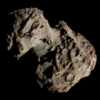33P/Daniel
| Discovery | |
|---|---|
| Discovered by | |
| Discovery date | December 7, 1909 |
| Alternative designations | P/1909 X1, P/1937 B1 |
| Orbital characteristics A | |
| Epoch | June 25, 2000 |
| Aphelion | 5.89 AU |
| Perihelion | 2.157 AU |
| Semi-major axis | 4.021 AU |
| Eccentricity | 0.4635 |
| Orbital period | 8.065 a |
| Inclination | 22.41° |
| Jupiter MOID | 0.152 AU (22,700,000 km)[1] |
| Last perihelion | August 22, 2016[1][2] July 20, 2008 |
| Next perihelion | 2024-Nov-11[3] |
Comet Daniel is a periodic comet in the Solar System discovered by (, Princeton University, New Jersey, United States) on December 7, 1909, estimated as magnitude 9.
Following its discovery, the returns for 1916, 1923, and 1930 were predicted but on each occasion it was not recovered.
The 1937 return was recovered by (Simada, Japan) on January 31 after a calculation of the comet's orbit by (Tokyo, Japan) after he took calculations for the 1923 return done by and took into account perturbations from Jupiter.
All returns apart from 1957 and 1971 have been recovered.
Repeated close encounters with Jupiter have increased this comet's orbital period steadily since it was first discovered, it will likely increase again to 8.29 years when it next encounters Jupiter on December 2, 2018.
The comet nucleus is estimated to be 2.6 kilometers in diameter.[1]
At some point between 2009 January 11 and 30 the comet underwent an outburst of around 3 magnitudes, brightening from 18th to 15th magnitude.[4]
References[]
- ^ a b c "JPL Small-Body Database Browser: 33P/Daniel". Jet Propulsion Laboratory. Retrieved 2010-02-26.
2009-04-24 last obs
- ^ 33P past, present and future orbital elements
- ^ MPC
- ^ "BAA Comet Section : Periodic Comets". Jonathan Shanklin. 2011-12-18. Retrieved 2012-10-26.
External links[]
- Orbital simulation from JPL (Java) / Horizons Ephemeris
- 33P at Kronk's Cometography
- 33P at Seiichi Yoshida's Comet Catalog
- Cometary object articles
- Periodic comets
- Numbered comets
- Comets in 2016
- Astronomical objects discovered in 1909
- Comet stubs

